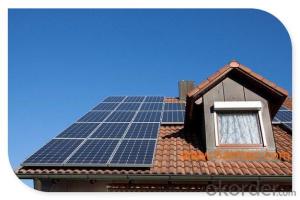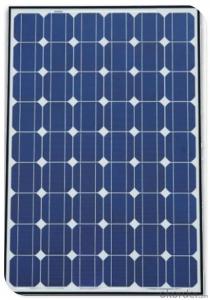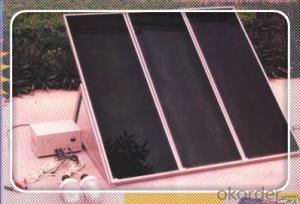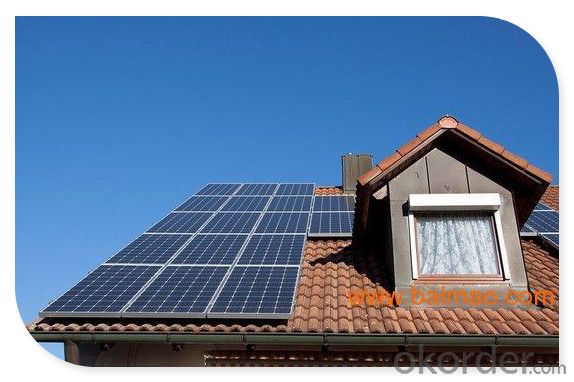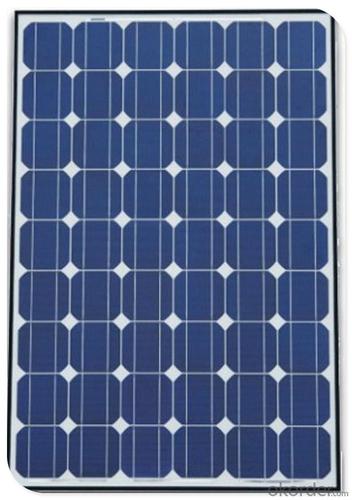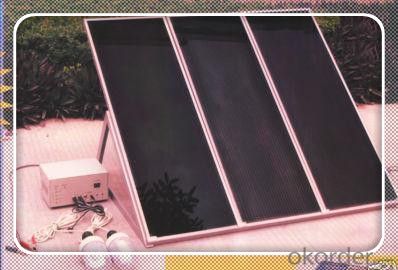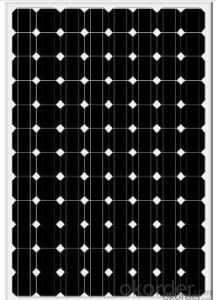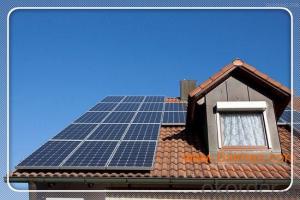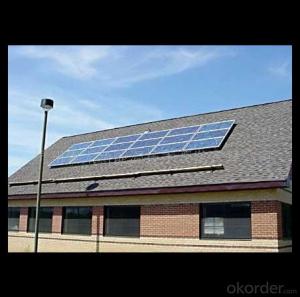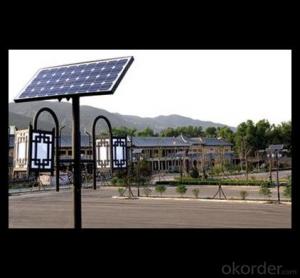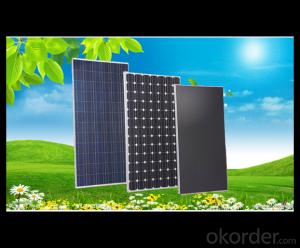Caravan Solar Panels:275w Direct Factory Sale Price 260-300watt Solar Panels
- Loading Port:
- China main port
- Payment Terms:
- TT OR LC
- Min Order Qty:
- 10000 watt
- Supply Capability:
- 100000 watt/month
OKorder Service Pledge
OKorder Financial Service
You Might Also Like
Specification
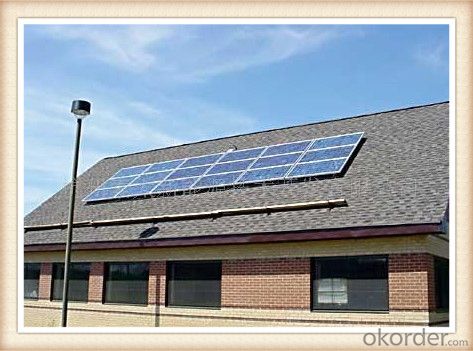
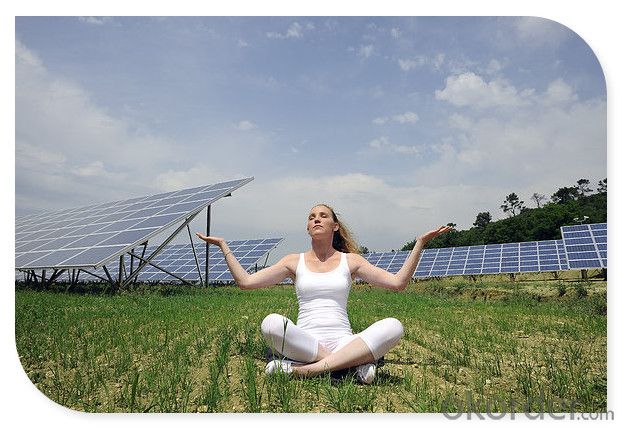
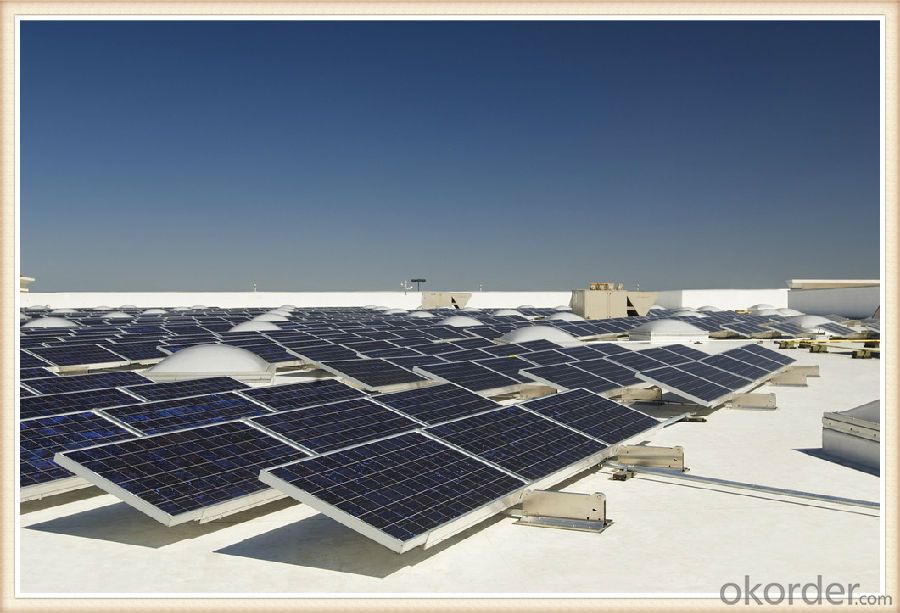
Solar Module Introduction
Solar modules use light energy (photons) from the sun to generate electricity through the photovoltaic effect. The majority of modules use wafer-based crystalline silicon cells or thin-film cells based on cadmium telluride or silicon. The structural (load carrying) member of a module can either be the top layer or the back layer. Cells must also be protected from mechanical damage and moisture. Most solar modules are rigid, but semi-flexible ones are available, based on thin-film cells. These early solar modules were first used in space in 1958.
Electrical connections are made in series to achieve a desired output voltage and/or in parallel to provide a desired current capability. The conducting wires that take the current off the modules may contain silver, copper or other non-magnetic conductive transition metals. The cells must be connected electrically to one another and to the rest of the system. Externally, popular terrestrial usage photovoltaic modules use MC3 (older) or MC4 connectors to facilitate easy weatherproof connections to the rest of the system.
Specification
Model Type | |
Peak Power-Pmax(W) | 5-200W |
Open Circuit Voltage-Voc(V) | 44.2 |
Maximum Power Voltage-Vmp(V) | 36 |
Short Circuit Current-Isc(A) | 5.4 |
Maximum Power Current-Imp(A) | 5 |
Maximum System Voltage | 1000V DC |
Maximum Series Fuse Rating | 10A |
Power Tolerance | -1~+3% |
Temperature Coefficients of Pmax | -0.45%/℃ |
Temperature Coefficients of Voc | -0.348%/℃ |
Temperature Coefficients of Isc | 0.031%/℃ |
Nominal Operating Cell Temperature | 44.5±2℃ |
Standard Testing Condition(STC) | Irradiance:1000W/m²;Temperature:25℃;AM=1.5 |
Qualification Test Parameters | |
Operating Temperature | -40℃~+85℃ |
Storage Temperature | -40℃~+85℃ |
Pressure Bearing | ≥5400Pascal/m² |
Wind Bearing | ≥5400Pascal/m² |
Mechanical Characteristics | |
Cell Size | Mono 125*125mm±0.5 |
No.of Cells | 72pcs(6*12) |
Dimension | 1580*808*40mm |
Weight | 15.5Kg |
Glass | 3.2mm High Transmission,Low Iron |
Frame | Anodized Aluminum Alloy |
Junction Box | IP65Rated |
Internal Diodes | 3 Bypass Diodes |
Cable | 1*4.0mm² Length 900mm |
Images
Packing & Shipping:
We have rich experience on how to pack the panels to make sure the safety on shipment when it arrives at the destination.
The normal size is packed by 25pcs/ carton / pallet. Paper carton for FCL shipping and wood carton for LCL shipping.
Features
1.High reliability with guaranteed -3% to +5% power output tolerance, ensuring return on investment
2.High conversion efficiency based on leading innovative photovoltaic technologies
3.Withstands high wind-pressure and snow load, and extreme temperature variations
4.Attractive appearanceUnique frame design, high mechanical strength, and easy Installation
Warranty:
For c-Si panel: 25years output warranty for no less than 80% of performance, 10 years output warranty for no less than 90% of performance. Free from material and workmanship defects within 5 years.
For a-Si panel: 20 years output warranty for no less than 80% of performance, 10 years output warranty for no less than 90% of performance. Free from material and workmanship defects within 2 years.
•100% product quality protection
•100% on-time shipment protection
•100% payment protection for your covered amount
FAQ:
(1)What price for each watt?
It depends on the quantity, delivery date and payment terms.
(2)What is your size for each module? Can you tell me the Parameter of your module?
We have different series of panels in different output, both c-Si and a-Si. Please take the specification sheet for your reference.
(3)Can you provide the peripheral products of the solar panels, such as the battery, controller, and inverter? If so, can you tell me how do they match each other?
Actually we are only manufacturer of solar panels, but we could try to source them for you in China if you need. We could provide you an optimal system design to instruct you how to install.
(4)Do you have the CE, TUV, UL Certification?
We’ve already passed all the tests, and any certificate is available.
(5)Have you ever sold your products to companies in my country?
Of course, we have customers in all general PV markets, but I think we should expand our market share along with the market growth.
(6)When did your company set up? You are a new company, how can I believe your quality?
We entered into Solar PV industry in 2005, now we have several plants in manufacturing of a-Si and c-Si panels, and our capacity is 220MW per year. Till now we have already passed all the tests by authorized laboratories, e.g. TUV, VDE, UL.
(7)Can you help us install the module if we cooperate with you?
We haven’t entered into installation sector, but we have the plan in near future.
(8) How do you pack your products?
We have rich experience on how to pack the panels to make sure the safety on shipment when it arrives at the destination.
(9) Can you do OEM for us?
Yes, we can.
(10)Can we visit your factory?
Surely, I will arrange the trip basing on your business schedule.
- Q: Can solar panels be used during a power outage?
- No, solar panels cannot be used during a power outage unless there is a battery backup system in place.
- Q: Hi.How efficienent are solar panels? I mean, suppose we install a kw panel.. Wil it produce 5kw in 5 hours of good sun light?Or like if its 80 percent efficient, wil it produce 4kw and so on.Also, do the chinese solar panels give the same results as compared with panels from other countries?I live in india, so we get plenty of sunlight during the day.Thanks
- Efficiency of photovoltaic panels usually describes the ratio between the energy of the sunlight falling onto the panels and the electric energy you get out. This number is, for commercially available panels today, usually in the range of 2...9 %. What you are asking is something else. The power from the panel depends on the light falling on it. A panel rated for kw peak will deliver that kw under a clear sky, with the sun orthogonally above the panel. For a fixed mounted panel, that is true (at most) for two days every year at noon. At any other time, the output is less. Therefore (at least for the area I live in), some people build databases (and Excel tools) in which the various variables are considered: - inclination of the panel - orientation of the panel - average sunshine duration during a year Plugging in these numbers, I get theoretically for my roof an electricity output of just over 000 kWh/year per installed kWpeak of collector power. If you set up a tracking panel (following the sun), the energy output of the panel will be higher, but so will be the cost for the mounting and the area needed to set up the system.
- Q: If a solar panel is a .5kW system, what length of time is it putting out that much power? Every hour?
- I think it refers to the maximum power it is capable of. Of course, it won't really have this output because it's energy output (kWh) is dependent on it's energy input...
- Q: i don't know very much about it, but can you somehow take off the little solar panels off of the outdoor light things and make it so you can hook an outlet up to it and plug in to it like a phone charger for electricity.
- Little solar panels on lights are very low power. The battery in one such may be 0.5 Amp-hours and .2 V ; it may be different but it should be marked on the panel/battery/manual. An outlet in your house is designed to run on 20 V (typically in N. Am.) and they run on alternating current (AC) whereas the panel generates direct current (DC). (If you don't know the difference, do not worry to much but just understand that they are not directly compatible.) You therefore need an inverter to change DC to AC (and lose some although inverters are now very efficient). But the amount of power generated by those panels is still very small. That is why solar lights are low power (just a few watts in most cases). To make things even more irritating, phone chargers do not work off 20 V AC as you are charging the battery and need a low voltage DC -- which is what the solar panel is giving you. It is almost certain that the voltage from the panel will be less than the voltage required for the phone. The charger is mostly cable but there is a black box incorporated and it should say what the voltage and current output are (the input will be 20V). So you should be able to overcome this not by hooking up the panel to a 20V outlet and then plugging the charger in but by hooking up the panel to the phone directly if you can get enough voltage out of the solar panel (or hook up several) and if you fashion a connection device. They already make them -- solar battery chargers and I am sure you can enter that into a search engine and find loads. Typically the panel alone is much more than a solar light -- which shows the relative power requirements.
- Q: I have a solar panel I bought for a diy project and it has a small plug on the end of it, but I need to remove this plug to expose the positive and return wires so I can solder a bunch of stuff together. How do I cut off the plug without shorting out the solar panel when I make the cut? Can I just leave it in the dark a while before cutting? I don't think I can remove the wires from the solar panel end before cutting.
- A solar panel doesn't store energy. As soon as the light stops, the current stops instantly. If it's a 200-watt panel or more, it won't be harmed by a short circuit, but it might be good to turn the panel over or cover it with cardboard before working on it. The spark can slightly mar the contacts. Doing the work indoors is enough to cut down the current, too. For a 60-watt panel or less, I wouldn't even worry about the spark, the power output is too low to do any damage.
- Q: Can solar panels be used in areas with high wind speeds?
- Yes, solar panels can be used in areas with high wind speeds. However, it is important to ensure that the solar panel installation is designed and engineered to withstand the specific wind conditions in the area. This may involve using specialized mounting systems and ensuring proper anchoring and structural reinforcement to prevent damage or dislodgement due to strong winds.
- Q: how big of an solar panel do i need to power/charge my laptop?would one from canadian tire sell the right one?
- Yes. Basically, here's what you need (I'm keeping this general on purpose): The panels themselves -- how large an area depends on average power consumption and how much power you can get on average. That, in turn , depends on climate. You'd need more in Seattle than Tuscon, for example. I'd guess something in the neighborhod of 0 square feet. Depends also on haow many gadgets (printers, etc.) you have. You'll need a power storage system. Lithium gives you the best poser density (of off-the-shelf stuff) but an ordinary car battery works well and is reliable. And, of course, a control system to manage the power generation/storage/use so everything works together without that annoying smell that tells you you just cooked a few hundred bucks worth of equuipment! :)
- Q: I'm wondering if the cost of the panels and equipment have come down enough to make them viable in areas like Seattle or Vancuver for example.
- Take okorder /.. You need to keep in mind that as long as you are renting your electric from the public utility you are doing just that and renting. You can resale the solar electric system if you move or if you just want to sale it and get some of your money back if not 20 % extra. Then all the years you used the system was all free electric. So it is already viable as you put it. Anything other then buying a system would not be. Here is a thought. The housing market slumped and if you paid 50K for your home it is now only worth if you can even sale it about 00K. Not worth the money but people are still buying homes even if they are not worth what they are being sold for. And then the cars and trucks people buy will never pay for them selfs but people still buy them and spend extra the more wasteful the car is. So why does solar have to pay for it's self or prove it's self? It has many times over but because you can't drive a solar panel drunk and party out in the bars with it is is not worth the money. I guess the is just being human and a double standard. What about the big up front cost of solar? I remember a 20% up front cost when I bought my home and my car and it is the same 20% or less for a solar loan. Plus the value of solar is going up not down like with homes and a car is not worth but half what you paid for it the minute you drive it off the car lot. I can only see good from solar un like other things we buy.
- Q: Are solar Panels worth it, Do they really quot;save moneyon electricity?
- Solar panel systems are one of today's best investments! What other product can you get that last for 25 years or more and saves you money every day of the year, but pays itself off in 5 to 0 years in most cases. Our company has installed well over 00 solar panels systems for clients who have declared independence from their utility! Contact us to learn more if you are in the Northeast US.
- Q: I really need to know about the good companies who are selling good quality home solar panels.I lives in Pakistan, solar panels sell here are cheap but they doesn't work for long time, mostly they are quot;made in chinaquot;.Consumption of units of our house written on our electricity bill is 300.My dad is seriously thinking of purchasing a solar energy system for house that long last and works efficiently.So plz help me out.
- Solar okorder
Send your message to us
Caravan Solar Panels:275w Direct Factory Sale Price 260-300watt Solar Panels
- Loading Port:
- China main port
- Payment Terms:
- TT OR LC
- Min Order Qty:
- 10000 watt
- Supply Capability:
- 100000 watt/month
OKorder Service Pledge
OKorder Financial Service
Similar products
Hot products
Hot Searches
Related keywords
